|
|
|
Sort Order |
|
|
|
Items / Page
|
|
|
|
|
|
|
| Srl | Item |
| 1 |
ID:
139595
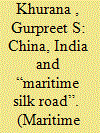

|
|
|
|
|
| Summary/Abstract |
In the coming years, the texture of China–India relations will be a crucial determinant of the geopolitical, economic and security environment of Asia, with a strong impact on the global order. Both countries have lately emerged as major economies. This has led to a dilation of their areas of maritime interest, and thereby a growing China–India interface at sea. This may be accompanied by both opportunities and challenges. Given the dynamism of recent developments, these need to be continually assessed and appraised as inputs for policy making. Among the most significant developments is China's “Maritime Silk Road” (MSR) initiative. In context of this development, this paper attempts to examine the convergences and divergences between China and India. While the bilateral divergences may continue to persist, the paper attempts to assess whether the two countries could capitalize upon the convergences to seize the opportunities presented by the MSR.
|
|
|
|
|
|
|
|
|
|
|
|
|
|
|
|
| 2 |
ID:
139594
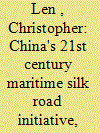

|
|
|
|
|
| Summary/Abstract |
In recent years, the Chinese leadership has increasingly turned its attention towards the maritime domain. This article discusses Beijing's latest attempts to secure China's maritime energy supply chain across the Indian Ocean region and the South China Sea through which the majority of its seaborne energy imports transit. As China increasingly relies on the seaborne energy trade, Beijing has come to attach more importance to the security of the sea lines of communication (SLOCs) and has a growing strategic interest in ensuring unimpeded access in these two areas. In this paper, the author discusses Beijing's efforts in the context of China's maritime power aspirations, particularly the 21st Century Maritime Silk Road initiative which is promoted by the current Chinese President, Xi Jinping. The author argues that Beijing's latest maritime agenda will be hampered by the strategic distrust and political risks China faces in the Asian region.
|
|
|
|
|
|
|
|
|
|
|
|
|
|
|
|
| 3 |
ID:
139598
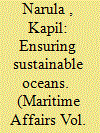

|
|
|
|
|
| Summary/Abstract |
Ensuring sustainable oceans and seas is vital for the well-being of the planet. However, oceans – which are the largest ecosystems – are degrading rapidly, which is a cause of anxiety. The paper presents some of the growing concerns about the health of the oceans and analyses three main drivers of ocean degradation, viz. overexploitation for resources, unintended impacts of anthropogenic activities and weak governance structures. Some of the ongoing work on adopting Sustainable Development Goals (SDGs) for the oceans, and by the Biodiversity Beyond National Jurisdiction (BBNJ) working group for governance of the “high seas”, are then discussed. The paper suggests a way ahead and proposes that India should play a larger role in the ongoing discussions. The paper concludes that there is a need for international cooperation and global support, and ensuring sustainable oceans is the key to sustainable development.
|
|
|
|
|
|
|
|
|
|
|
|
|
|
|
|
| 4 |
ID:
139599


|
|
|
|
|
| Summary/Abstract |
States are facing new challenges with respect to conservation and sustainable use of marine biological diversity in areas beyond national jurisdiction (BBNJ). This underscores a significant gap in the existing legal regime, as embodied in the 1982 United Nations Convention on the Law of the Sea (UNCLOS), for protection of marine biological diversity beyond national jurisdiction. Thus, there is a critical need for a legal instrument to specifically address the regulatory and governance gap in this area. To this end, the United Nations General Assembly (UNGA) has set up an ad-hoc BBNJ Working Group. In January 2015, the BBNJ Working Group recommended that an international legally binding instrument under UNCLOS needed to be developed. This will enable UNGA to decide in its forthcoming 69th Session, in 2015, whether or not to launch negotiations for a new Implementing Agreement under the UNCLOS on the conservation and sustainable use of the marine biological diversity in areas beyond national jurisdiction. The details and contours of the new legal instrument, however, have yet to be agreed to, by the international community. It is suggested that international community may consider the precedent of the United Nations Fish Stock Agreement (UNFSA) for taking the next steps in devising a legal instrument. Further, there is also a need to consider an institutional arrangement to address existing BBNJ governance gaps.
|
|
|
|
|
|
|
|
|
|
|
|
|
|
|
|
| 5 |
ID:
139596
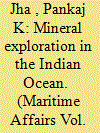

|
|
|
|
|
| Summary/Abstract |
India's lack of a concrete policy towards exploration for mineral resources in high seas and offshore areas has played a role, though to a limited extent, in the exploration projects being awarded to countries like Korea and China in the Indian Ocean. In 2011, China was awarded a large area in the Indian Ocean for mineral exploration. India has thence awakened to the issue and has made amends to its bureaucratic inertia. However, the question is whether these mineral exploration projects and demarcated ocean areas have economic implications only, or have larger strategic significance. In the contemporary debates, the ocean economy is gaining traction with more and more littoral nations seeking to generate revenue as well as royalty from ocean resources. This paper therefore attempts to address the issues of ocean economy, mineral exploration, exclusive economic zones (EEZ), interests of small island nations, and how these issues have a larger strategic implication.
|
|
|
|
|
|
|
|
|
|
|
|
|
|
|
|
| 6 |
ID:
139597


|
|
|
|
|
| Summary/Abstract |
Marine species are known to use acoustic signals for biologically critical functions such as foraging, communication, navigation, etc. The unregulated maritime activities in the Indian Ocean Region (IOR) are translating into a rapid rise in the ambient noise and consequent acoustic degradation of the marine ecosystem. The environmental conservation initiatives are seen to be in direct conflict with the economic growth imperatives and are thus faced with significant political opposition. The lack of awareness regarding the acoustic aspect of the marine ecosystem towards generating credible underwater domain awareness is a major cause of concern and limits the effectiveness of any conservation efforts. Further, the IOR with its tropical littoral waters presents suboptimal performance of the underwater sensors deployed to generate underwater domain awareness. The authors attempt to provide an alternate perspective of the acoustic degradation of the marine ecosystem as a result of heightened maritime activities in the IOR. The complexities of formulating the regulatory framework and associated monitoring mechanism are also discussed.
|
|
|
|
|
|
|
|
|
|
|
|
|
|
|
|
| 7 |
ID:
139600
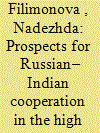

|
|
|
|
|
| Summary/Abstract |
The paper examines emerging prospects for Russia–India cooperation. While the two countries can collaborate in various areas of mutual interest, the paper identifies possible challenges and effects on the cooperation in the Arctic region. The sanctions imposed by the West could impede Russian energy projects in the Arctic. This could force the state to find a way to replace Western technologies through enhancing capacities of national industry and developing cooperation with other states, including Asian countries. This shift is also bolstered by the political interest to strengthen the position of Russia in the Asian region as a whole, and to increase the country's energy security. The paper provides an overview of the Russian and Indian interest and policy in the Arctic, and presents the perspectives and challenges for both countries.
|
|
|
|
|
|
|
|
|
|
|
|
|
|
|
|
| 8 |
ID:
139601


|
|
|
|
|
| Summary/Abstract |
It is estimated that over the next two to three decades, the global naval shipbuilding industry could see an investment of over US $835 billion in new warship and submarine construction. In an ambitious effort, many countries are now analysing the strengths and weaknesses of their respective naval shipbuilding industries in order to renew their naval fleets. Towards this end, specialist studies and research have been commissioned by various stakeholders, to take a strategic look at the shipbuilding industry to determine lessons from some recent naval construction programmes, identify capacity limitations (in terms of infrastructure, skills and character of the workforce, and suppliers who constitute the ecosystem) and explore policy options that are open to the government and the industry to overcome any limitations. This paper presents a review of a few of these studies and identifies the factors that are likely to impact on future naval construction and acquisitions. The paper also examines trends in naval design and construction technologies and presents possible lessons for the Indian naval shipbuilding industry.
|
|
|
|
|
|
|
|
|
|
|
|
|
|
|
|
|
|
|
|
|